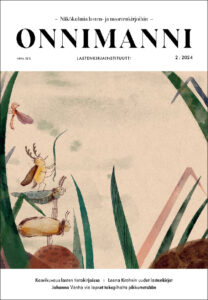
In recent years, exceptionally many Finnish books expressing concern for the preservation of nature’s biodiversity has been published for children, teenagers and adults. Hence, this issue of Onnimanni is dedicated to this timely topic.
Facing advancing climate change and eco-anxiety, we expect children’s books to partake in environmental education. Toni Lahtinen, who is familiar with eco-critical literature studies, has reviewed Kirsti Manninen, Juha Kuisma and Jussi Kaakinen’s non-fiction book Muutosten maa: Suomen lasten ympäristöhistoria (Otava 2024). Lahtinen raises the legitimate question of how future children’s books can successfully raise young readers into sophisticated eco-citizens.
In their latest works, Emilia Erfving, Miina Mäki and Juha Kauppinen address subjects such as the biodiversity of the forest, the sea and nature. Interviewed by J. S. Meresmaa, they stress how they – besides provide information – have tried to increase young readers’ understanding of nature.
In writer Johanna Venho’s children’s books, nearby nature offers children magic and wonder, as well as peace and quiet. In Metsämuistikirja (Forest Field Notes, Teos 2022, illustrated by Sanna Pelliccioni) a child protagonist arranges a ”silent protest” in order to save the local forest. Venho, who used to find it difficult to address current issues in her children’s books, realized that the prevailing circumstances required a new approach.
Jussi Uotila has written an article on Leena Krohn’s latest books for children. Whether intended for children or adults, Krohn’s books deal with similar ecological, social and individual themes. Krohn’s latest three children’s books are verse novels illustrated by herself.
In her literary bachelor’s thesis, Julia Karjalainen studies the depiction of plants in three story-based non-fiction picturebooks. Plants are typically humanized in children’s books, yet these non-fiction books still manage to depict plants as part of a larger and diverse communicative ecosystem.
This spring, librarian Päivi Nordling has retired after working 33 years at the Institute. Päivi and her successor Anna Tiitinen exchange thoughts on how library practices have changed and on the future challenges of managing a special library and its collections.
Translation: Maria Lassén-Seger
